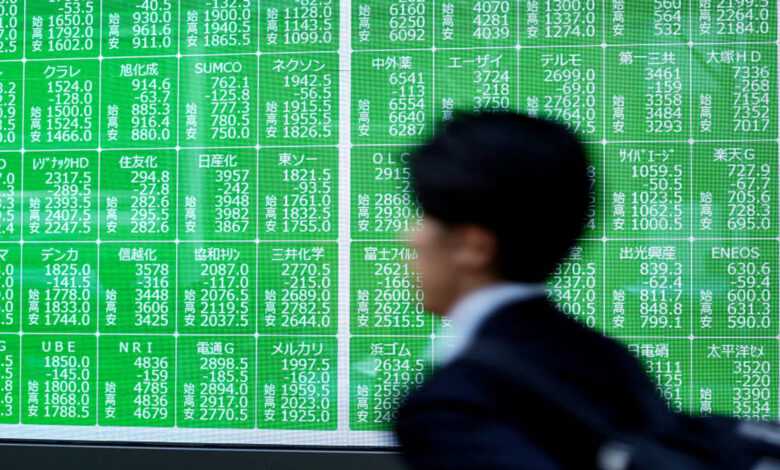Japan assets saw record inflows in April as investors fled U.S. markets

A person walks past a digital display showing the Nikkei 225 index on the Tokyo Stock Exchange on a street in Tokyo on April 7, 2025.
Kazuhiro Nogi | Afp | Getty Images
Japan experienced a surge in foreign investments in its equities and long-term bonds in April, with investors shifting away from U.S. markets following President Donald Trump’s trade actions.
Foreign investors purchased 8.21 trillion yen ($56.6 billion) worth of equities and long-term bonds in April, marking the highest net inflow for a calendar month since data collection began in 1996, according to Morningstar.
“The impact of Trump’s tariff announcements likely influenced global investors’ perceptions of the U.S. economy and asset performance, prompting a diversification towards other major markets like Japan,” stated Yujiro Goto, Nomura’s head of FX strategy in Japan.
With the U.S. adopting a more conciliatory approach to trade and reaching agreements, including with China, confidence in U.S. assets is being restored. What does this mean for Japanese assets?
It was quite an exceptional month, considering the global macroeconomic environment.
Kei Okamura
Neuberger Berman
Most of the 8.21 trillion yen net inflows occurred in the first week following April 2, according to ministry data.
Following Trump’s tariff announcements, the U.S. 10-year Treasury yield rose by 30 basis points (April 3 to 9), while Japan’s 10-year yield decreased by 21 basis points (April 2 to 8).
Despite a global equity sell-off post-Trump tariffs, Japan’s Nikkei 225 saw a 1% increase for the month, compared to the S&P 500, which dropped by just under 1%.
Japanese assets are typically seen as safe havens, with their appeal growing as the “sell-U.S.” narrative gained traction in April, noted Rashmi Garg, senior portfolio manager at Al Dhabi Capital.
The influx was driven primarily by institutional investors rather than retail investors, according to Nomura’s Goto. Pension funds and other asset managers likely made aggressive equity purchases, while Japanese bond acquisitions were largely led by reserve managers, life insurers, and pension funds.
“It was truly an extraordinary month, considering the global macroeconomic climate,” remarked Kei Okamura, Neuberger Berman’s MD and Japanese equities portfolio manager.
“This had a significant impact on how global investors approached asset allocation towards the U.S., prompting the need for diversification,” he added.
Looking Ahead
Garg from Al Dhabi Capital anticipates a slowdown in inflows following progress in U.S.-China tariff negotiations and potential deals with other nations, such as the recent trade agreement between the U.S. and Britain.
While the record monthly inflows may not be sustained, market observers remain optimistic about Japanese assets and expect continued strong inflows.
Trump’s policy reversals have weakened U.S. asset credibility and confidence, potentially leading global fund managers to reduce investments in U.S. markets in favor of other options, explained Vasu Menon, OCBC’s managing director of the investment strategy team.
“Given this backdrop, the demand for Japanese assets could remain robust, even if not at the April levels,” Menon stated. Talks between Japan and the U.S. regarding tariffs have also sparked optimism about reducing the 24% “reciprocal” tariffs on Japan, he added.
Japanese stocks are set to benefit from the Tokyo Stock Exchange’s corporate governance reforms, which focus on enhancing shareholder returns, as highlighted by Asset Management One International.
The TSE’s governance reforms, initiated in March 2023, require listed companies with shares trading below a price-to-book ratio of one to either comply or provide an explanation. This initiative aims to enhance Japan Inc.’s appeal to both domestic and foreign investors.
This reform initiative has led to anticipated record levels of share buybacks in Japan, boosting earnings per share and supporting share prices, according to Asset Management One International.
While the dollar has shown some strength post-April sell-off, the potential for further weakening and strengthening of the Japanese currency makes Japanese equities an attractive option, especially as the economy rebounds, noted Neuberger Berman’s Okamura.
“This trend is likely to continue, with Japan expected to attract significant inflows,” Okamura predicted.
Michael Makdad, equity research analyst at Morningstar, foresees higher net inflows into Japanese equities compared to the past decade, driven by improved corporate governance.
However, Makdad does not anticipate the same level of net inflows into short-term Japanese Treasury bills as during the Bank of Japan’s negative interest rate period, as the arbitrage opportunities for foreign investors have diminished.





